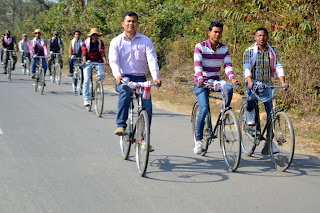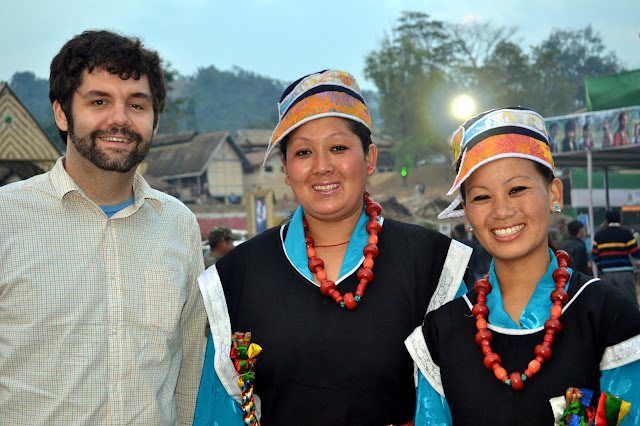The Khamti community in Arunachal Pradesh say that Pang Sau
means ‘camping place’ and when they migrated here as Tai-Khamtis, they did take
rest here. Today also they visit the Pangsau Pass as a pilgrimage to pay
respect to their ancestors. The Singpho and the Tangsa communities too consider
this pass as a sacred place.
The area still has the remains of the heritage wilderness,
community traditions and happenings of World War II, which the world with
nostalgia wants to experience. Keeping this in view the local communities of
Jairampur, Nampong, Manmao and Rima got together with Help Tourism in 2006 to
warm-up for the ‘Pangsau Pass Winter Festival’. The official event was launched
in 2007 with the active support of Government of Arunachal Pradesh.
Arunachal Pradesh celebrated her 25 years statehood in India
on the 20th of February, 2012. This was a Union Territory of India
under North East Frontier Agency and Governed under the Governor of Assam till
1972. On 20th February, 1987, Arunachal Pradesh became the 25th
state of India. Inbetween this was a Union Territory placed under the Chief
Commissioner. To enter any place in Arunachal Pradesh, even every Indian
citizen has to seek permission under the Bengal Frontier Regulation Act
1872-73, implemented by the then British administration.
The 02 best ancient neighbours, connected through Buddhism
historically are fighting over their borders, mainly over Arunachal Pradesh.
The Chinese defence forces reached Tezpur in Assam in 1962 and still issues
stapled visas or no visa to Indians from Arunachal Pradesh, with the claim that
these Indians in Arunachal Pradesh are Chinese citizens and would not need a
visa to visit China. I am sure travellers in China and India will always want
to visit each other’s country, like the Buddhist era, with respect for each
other’s country and sharing the great knowledge and traditions. All travellers
worldwide look forward to land travel or river routes in Asia with single Asian
Visa.
There is an event which was organized during this year’s PPWF
2013 (Pangsau Pass Winter Festival 2013) by the PPWF committee, Assam Rifles,
Nature’s Beackon and Help Tourism, the common man’s bicycle expedition from
Ledo to Pangsau Pass, an event for people in Upper Assam and Eastern Arunachal
Pradesh to realise their ownership on the Pangsau Pass. The popular Assam
legend says that the Tai Ahoms, when they entered the Lohit-Brahmaputra valley through
Pangsau Pass, under the leadership of the Great Chaolung Sukhapaa in the early
13th century, they pledged never to return beyond the Nangyang Lake,
which came to be known as the ‘Lake of No Return. The Allied forces part of the
story says that while flying over the hump, all radio signals would be lost and
the lake would hallucinate as a landing area, and as the cargo planes would
force land over there, lost in a densely forested landscape, the big flying
carriers would be lost in the lake waters forever. Many local people still find
remains of such planes scattered in the hump and lake.
There are some extraordinary experiences of travellers to
this area in all respects: journey, nature, people, rivers, food, history,
legends etc. All those who are interested in contributing to the legends of the
Lake of No Return and stories from the Pangsau Pass, and want them published in
this blog, please email write-up or photographs or documents to
atishdipankara@gmail.com. 



















Looking forward to travelling the entire Stilwel Road, preferably in your company.
ReplyDeleteA dream coming true, Raj Da.
ReplyDeleteVery interesting post. After reading this post interested to travel arunachal Pradesh. I was visited guwahati when i was stayed in Luxurious hotel-in-guwahati :: ROYALE de CASA and i have excellent experience.
ReplyDelete